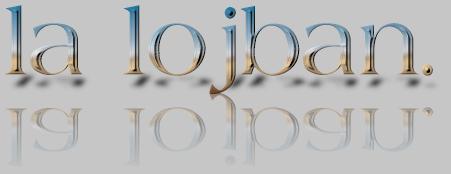

That redevelopment was then called "Loglan-88" because we targetted it to be done by the beginning of 1988. At that point we only planned to redo the words and were not considering grammar redevelopment, a plan that changed later that summer, when the significantly larger group that had become interested met at my house and we adopted the name "Lojban - A Realization of Loglan" as the working name. Now of course, everyone calls it just Lojban, and we have had 5 years of edgy peace since the courts ruled in our favor in the use of Loglan to refer equally to our efforts as to JCB's original language and the rump community that still uses that version.
We've come a long way since then, and have a community of skilled speakers and writers of the language, a net-published book that will hopefully see print pretty soon, and maybe also a dictionary as well. We've baselined the language design, and people all over the world are learning the language, and sometimes even posting on Lojban List trying to use it (for which I thank all of you - let us see more in the future).
Loglan/Lojban has been described as the first ever successful language development by a committee. Let us hope it continues as a successful language development by a community.